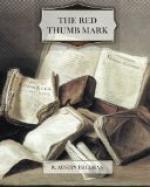“Fifth: He has probably purchased, quite recently, a second-hand ‘Blick’ fitted with a literary typewheel. “Sixth: That machine, whether his own or some other person’s property, can be identified by a characteristic mark on the small ‘e.’
“If you will note down those six points and add that X is probably an expert cyclist and a fairly good shot with a rifle, you may possibly be able, presently, to complete the equation, X = ?”
“I am afraid,” I said, “I do not possess the necessary data; but I suspect you do, and if it is so, I repeat that it is your duty to society—to say nothing of your clients, whose interests would suffer by your death—to have this fellow laid by the heels before he does any mischief.”
“Yes; I shall have to interfere if he becomes really troublesome, but I have reasons for wishing to leave him alone at present.”
“You do really know who he is, then?”
“Well, I think I can solve the equation that I have just offered to you for solution. You see, I have certain data, as you suggest, which you do not possess. There is, for instance, a certain ingenious gentleman concerning whom I hold what I believe to be exclusive information, and my knowledge of him does not make it appear unlikely that he might be the author of these neat little plans.”
“I am much impressed,” I said, as I put away my notebook, after having jotted down the points that Thorndyke had advised me to consider—“I am much impressed by your powers of observation and your capacity for reasoning from apparently trivial data; but I do not see, even now, why you viewed that cigar with such immediate and decided suspicion. There was nothing actually to suggest the existence of poison in it, and yet you seemed to form the suspicion at once and to search for it as though you expected to find it.”
“Yes,” replied Thorndyke; “to a certain extent you are right. The idea of a poisoned cigar was not new to me—and thereby hangs a tale.”
He laughed softly and gazed into the fire with eyes that twinkled with quiet amusement. “You have heard me say,” he resumed, after a short pause, “that when I first took these chambers I had practically nothing to do. I had invented a new variety of medico-legal practice and had to build it up by slow degrees, and the natural consequence was that, for a long time, it yielded nothing but almost unlimited leisure. Now, that leisure was by no means wasted, for I employed it in considering the class of cases in which I was likely to be employed, and in working out theoretical examples; and seeing that crimes against the person have nearly always a strong medical interest, I gave them special attention. For instance, I planned a series of murders, selecting royal personages and great ministers as the victims, and on each murder I brought to bear all the special knowledge, skill and ingenuity at my command. I inquired minutely into the habits of my hypothetical victims; ascertained who were their associates, friends, enemies and servants; considered their diet, their residences, their modes of conveyance, the source of their clothing and, in fact, everything which it was necessary to know in order to achieve their deaths with certainty and with absolute safety to the murderer.”




